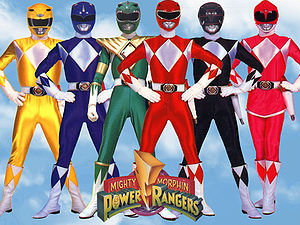Power Rangers (TV series)
Date: 1994
Region: North America, Australia
Subject: Violence
Medium: Television
Artist: Mighty Morphin Power Rangers television show
Confronting Bodies: Canadian government and New Zealand government
Dates of Action: 1994
Location: Canada and New Zealand
Description of Artwork: Power Rangers is a television show aimed at 9 - to 12 year-olds. The show features six teenagers, four boys and two girls, who morph into superheroes. The superheroes are either ninja fighters or robotic dinosaurs, who protect Earth from Godzilla-like monsters sent by Rita Repula (also referred to as "the evil Lord Zed").
The Incident: Power Rangers has been shown in approximately 30 countries world wide, with little controversy. However, in 1994 the program was declared too violent for Canadian television and pulled from screening on several free-to-air channels, although Canadians with cable continued to receive the show through Fox network. Some Scandinavian countries also dropped the program. The most notable controversy surrounding Power Rangers took place in New Zealand. The show first aired on New Zealands free-to-air television channel during the months of May and July of 1994. During this period, four formal complaints about Power Rangers were referred to the Broadcasting Standards Authority (BSA). Two of the complaints came from parents and teachers of kindergarteners. One was from the Children's Media Watch, a lobby concerned with children's TV programming, and another came from the mother of young children. The BSA also received a large number of informal written and telephone complaints about the series. The complaints focused on the Power Rangers' use of violence as a means of resolving conflict, and the negative impact of the show on the behavior of children, particularly preschoolers, who were intimidating the martial arts actions. Against the complaints, the broadcaster, Television New Zealand (TVNZ) argued that the series empowered children, offering positive role models and demonstrating values such as self-esteem, courage, responsibility and teamwork. The complainants were not satisfied with TVNZ's defense of the show, and the BSA now became more closely involved. After considering the complaints, the BSA decided in favor of the complainants stating the show was in fact too violent.
Results of Incident: While the BSA does not have the power to direct the broadcasters or ban television shows, their verdict in the matter was influential. The decision made by the BSA resulted in TVNZ canceling the Power Ranger's show from the channel's regular line-up.
Source: Censorship: A World Encyclopedia. Ed. Derek Jones. Chicago; London: Fitzroy Dearborn, 2001.
